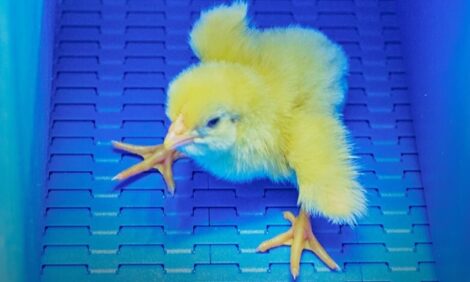



The impact of feed quality on poultry health & performance in the antibiotic-free era
Antibiotic-free production calls for a change of attitude at the whole company levelTransitioning to antibiotic-free (ABF) broiler production presents several significant challenges, demanding a comprehensive overhaul of all production practices and management, from the feed mill to broiler breeders, broiler production and processing.

Dr. Enrique Montiel, Anitox Global Director of Nutrition and Live Production, explains “antibiotic-free production requires a whole system approach including pullets, hens, hatchery, broiler farms, feed quality and good biosecurity. This is a fundamental change of direction to improve current production practices where every segment needs to be involved with a mindset of aiming to improve the current practices. Raising chickens without antibiotics makes the resolution of usual health issues more difficult and can lead to reduced performance. This shift also raises animal welfare concerns, as ensuring animal health without antibiotics requires meticulous management and alternative disease prevention strategies.”
Intestinal health continues to be one of the main concerns and maintaining a healthy gut microbiome is critical. Imbalances in gut microbiota produce dysbiosis, which can lead to various health issues, including feed passage and necrotic enteritis with a negative impact on litter quality potentially resulting in pododermatitis.
“In the absence of antibiotics, the poultry industry is adopting enhanced biosecurity measures, proper sanitation and non-antibiotic products such as feed additives to promote gut health,” Dr. Montiel notes. “ABF production calls for a change of attitude at the whole company level. For example, we are now aiming for more uniform pullet flocks, which calls for upgraded strategies pertaining to brooding, handling, vaccine administration, timely check of vaccine takes, feeding space, proper stimulation and grading during the pullet phase. At the breeder level, efforts are centered to produce cleaner eggs by minimizing floor eggs, avoiding sanding or washing and managing the flock properly to avoid male and female overweight.”
Recent work suggests that minimizing feed microbial loads in broiler breeders would lead to cleaner eggs (Avila et al, 2023). Hatcheries need to continue to ensure the supply of clean eggs and sanitation status at the machines and environmental level is periodically evaluated through bacterial counts.

“At the same time, incubation and hatching processes require constant optimization since improvements at the pullet, breeder and hatchery level will be reflected in the broiler operations. Cleaner eggs will help minimize early bacterial infections; however, broiler brooding, feeding and feed quality, air quality, water line sanitation and litter quality need continued improvement under ABF production. Brooding temperature is particularly important because it can predispose the chicks to bacterial infections that can increase first-week mortality or settle in the joints and continue to cause disease and mortality in older birds. Feed quality and any negative impact of feed changes, especially from starter to grower at 14-17 days of age, must be addressed. Poultry production without antibiotics demands attention to detail and is often more labor-intensive and costly. Proper environmental and management practices and biosecurity are essential for disease prevention and maintaining bird health,” explains Dr. Montiel.
Early disease detection and treatment, along with ongoing adjustments to management practices are critical to ensuring success in ABF production. Additionally, he emphasizes the need for “ongoing research and development to identify new strategies and technologies for supporting ABF production.”
Through a multi-faceted approach focusing on gut health, disease prevention, and meticulous management practices, the poultry industry can navigate the complexities of ABF production and meet the growing consumer demand for antibiotic-free products.
The Role of Feed Quality in ABF Production
Within antibiotic-free (ABF) broiler production, feed quality plays a pivotal role in maintaining poultry health and performance. According to Dr. Enrique Montiel, feed quality can be optimized through several strategies.
"Providing high-quality feed, free from infectious and non-infectious disease agents, supports overall bird health and growth," says Dr. Montiel.
Feed formulation should promote gut health by including essential nutrients at the proper level. Avoiding high levels of mycotoxins, antitrypsin and peroxides (suggesting fat rancidity) are common screening practices. Incorporating different additives such as probiotics, prebiotics and enzymes into feed can help promote better performance and a healthy gut microbiome.
Dr. Montiel explains, "Probiotics and prebiotics provide interventions to enhance nutrient absorption and overall health. These additives can help mitigate the absence of antibiotics by enhancing gut health and feed efficiency," notes Dr. Montiel. “Additionally, feed sanitation provides a viable option to decrease microbial loads in feed leading to gut health and improved performance.”
Feed sanitizers, applied at low rates, effectively reduce microbial loads in feed and offer long-term protection against recontamination, preventing the entry of poultry pathogens through feed.
Dr. Montiel highlights recent advancements: "We've found that reducing feed microbial loads significantly enhances poultry health and performance. Our trials with leading research organizations and global producers have shown that sanitized feed improves weight gain, feed conversion and reduces mortality in broilers."
Alternative Strategies for Gut Health
Maintaining gut health is fundamental to the success of antibiotic-free (ABF) production. Dr. Enrique Montiel, emphasizes several alternative strategies to promote gut health focused on litter management, optimal feed transitions, stocking density, downtimes between flocks and ensuring the quality of the feed and water supply.

Effective litter management and ensuring adequate coccidiosis cycling are crucial for maintaining gut health and preventing disease. "Proper litter management can significantly reduce the risk of gut health issues," says Dr. Montiel, “primarily through helping to create a healthier environment for the birds, minimizing the chances of infections and improving overall flock health.”
Additionally, handling feed transitions carefully plays an important role in minimizing the overall impact on intestinal health. Dr. Montiel explains, "Sudden changes in feed can disrupt the gut microbiome and lead to health issues. By properly managing feed changes , producers can help maintain a stable gut microbiome, reducing stress and the risk of intestinal disorders.”
“Proper stock density and ensuring adequate downtime between flocks help reduce disease risk and maintain a healthy living environment,” notes Dr. Montiel. “Adequate space and rest periods between flocks allow for better management of potential health issues and improve the welfare of the birds.”
Lastly, Dr. Montiel stresses, "Reducing microbial loads in both feed and water is essential for maintaining a healthy gut environment. High-quality feed and clean water are critical components in preventing the introduction of harmful pathogens and supporting a robust gut microbiome.”
By implementing these strategies, poultry producers can effectively promote gut health and manage flocks without relying solely on antibiotics, leading to healthier birds and safer food production. Dr. Montiel concludes, "Focusing on feed quality and alternative health management strategies leads to healthier birds and safer food production, meeting the growing consumer demand for antibiotic-free products."
To learn more about how feed sanitation can support your ABF initiatives, contact your clean feed expert today.








